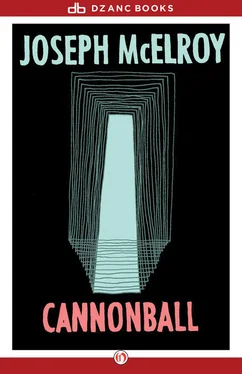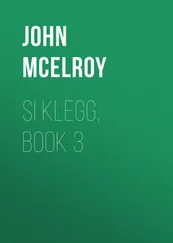Joseph McElroy - Cannonball
Здесь есть возможность читать онлайн «Joseph McElroy - Cannonball» весь текст электронной книги совершенно бесплатно (целиком полную версию без сокращений). В некоторых случаях можно слушать аудио, скачать через торрент в формате fb2 и присутствует краткое содержание. Год выпуска: 2013, Издательство: Dzanc Books, Жанр: Современная проза, на английском языке. Описание произведения, (предисловие) а так же отзывы посетителей доступны на портале библиотеки ЛибКат.
- Название:Cannonball
- Автор:
- Издательство:Dzanc Books
- Жанр:
- Год:2013
- ISBN:нет данных
- Рейтинг книги:5 / 5. Голосов: 1
-
Избранное:Добавить в избранное
- Отзывы:
-
Ваша оценка:
- 100
- 1
- 2
- 3
- 4
- 5
Cannonball: краткое содержание, описание и аннотация
Предлагаем к чтению аннотацию, описание, краткое содержание или предисловие (зависит от того, что написал сам автор книги «Cannonball»). Если вы не нашли необходимую информацию о книге — напишите в комментариях, мы постараемся отыскать её.
continues in McElroy's tradition of intricately woven story lines and extreme care regarding the placement of each and every word. A novel where the sentences matter as much as the overall story.
Cannonball — читать онлайн бесплатно полную книгу (весь текст) целиком
Ниже представлен текст книги, разбитый по страницам. Система сохранения места последней прочитанной страницы, позволяет с удобством читать онлайн бесплатно книгу «Cannonball», без необходимости каждый раз заново искать на чём Вы остановились. Поставьте закладку, и сможете в любой момент перейти на страницу, на которой закончили чтение.
Интервал:
Закладка:
For why had the captain said it like that, instead of, Anybody in your family in… ? Or Was your father in ? Or — for it was almost as if — I couldn’t say it in words, as I told this captain a thing or two about my father’s friend who was one of the few guys he would listen to for long. The captain agreed silently. “And he was right,” I said. Captain nodded. This exception an older friend in Wisconsin, with a binder full of plastic-sleeved posed-corpse snaps who hunted whitetail deer with legendary skill owing he said to what he had learned along the Cua Viet River in the early 70s. The stealth needed to survive serving in a so-called Studies and Observation Group, to say nothing of his old M-1951 flak vest in case he was shot at by another numbskull out in the woods — too hot to wear in the jungle in the old days, comfortable in hunting season now: so now he would stalk a doe and buck by wading a stream never lifting his feet out of the water — deer didn’t associate streams and humans, if you wanted to know. On the ground he adopted a high crawl — hands and knees in waist-high cover, in low you went on your belly like deer scraping under a fence.
Knowledge is power, it breeds respect, my father had told me driving home from practice — respect for deer, my father added of this friend with whom he went along once or twice a year but who did not hunt himself though fished for old ironsnout pike just to get them. It was that other war not properly finished that his friend recalled—“that he’s scared now that he wasn’t scared then: understand?” said my father wheeling a practically rightangle turn in front of a ghostly oncoming truck into our street, explaining because what was obvious if you have to ask can’t be explained to you but he was explaining in case—“And that he lost time once, time itself — do you understand, Zach? — ” not understanding, himself, how I loved him for that “time” weirdness—“a dead gook lying face up in the river, minutes on end, he thought, underwater, and so he moved on” the way SOG trained for silently, but the VC must have held his breath, next thing my father’s friend heard something, dived behind a tree, VC winged him, the dead-in-the-water VC up and firing. “With what?” I said—“he stashed his rifle out of the water?” “With what, with what? For God’s sake, Zach, do you understand what I’m saying?” “A sound you said, Dad — what kind of sound?” “What kind of—!” My father was angered by questions he understood as a substitute for something else like silence or…competitive performance, I actually said now to the captain, feeling disloyal. “They were stupid questions but I asked them: Were flak vests designed to stop bullets?” “Stupid?” said the captain. “‘And you went hunting, Dad, even if you say you didn’t really, and I don’t have a big case for the deer if they want to hang around and get shot.’” The captain laughed. I said, “The stupid questions are the right ones sometimes.” “If you keep them to yourself,” the captain said. “Where I overshoot,” I said—“You still do, so watch it,” he said. It was like So long , which shouldn’t have bothered me.
“Your work…” he said, he had been smoking too much — my “work” had gone largely unnoticed, I had thought, some not clear enough, the child with his mouth wide open on teeth and the taste buds only, it was for the files, not the international wires—“Tell me about it,” said the captain. “—for Intelligence (?).” “Your work is known,” the captain said then. DC came into my head, the War Memorial with all the names, Lincoln Memorial with his words in stone. Captain eyed his desk, as if I was leaving. My training at a base near DC had proved routine, a Chaplain training there to be a highly specialized photographer had asked me why I’d enlisted, and at once dismissing my thought with his, which I interrupted without hearing, they sparked new thoughts in me but what had he said about everyone doing their job? — he had vanished into a building, his heavy midsection supported by long, gangly legs that seemed out of another life, or he was to be cut in two, this deeply intelligent and humorous and divided man, not so divided after all, leaving me unsure if he meant what he said about the division of—
I thought I was dismissed. The captain took in the window and the music running on. “Better not Forward any more pictures”— to personal correspondents , he meant. He was coughing fit to die. What did either of us have to offer? His voice gave off an animal-enough sound without inflection. It said I would take a couple days off starting at once to be ready for another assignment.
“You will keep it to yourself.”
Plenty of experience in that quarter. Keep…? (A weatherwoman I knew personally and had tried to know better had been told the same thing.)
“Scroll Down. Operation Scroll Down.” He looked into my face as if I might know already, or something like that. A GI, earphones at the ready, sloped past between me and the window. I would be receiving my orders. It was quite an opportunity, captain said, pulling out a desk drawer as if it was one of the things he had. Some paperwork.
Ready ? I thought; what would I do? A hotel near the river had become the stock exchange, maybe it could get blown up along with the sewer (though be it noted that sewage privatization in the war zones had been put on hold, in the sense of retention rather than hands-on). “Your billet, you will keep its location to yourself.” My orders would identify me and what I did and announce my appearance in advance. My job, what was it again? Dividing the labor but how? The way you make jobs? The way you halve the distance endlessly?
Could I use the laptop?
“It’s down.” The captain put down his pen and clasped his hands. Looking at his hands, I missed Milt, who had not answered an e-mail I had sent on someone’s laptop down in Khawr. Was it my fault? I would try for a reaction at home when I thought of it.
Opportunity was what I had come here for, I said. Yeah well, said the captain. Opportunity was ineetiative. Try to photograph that, I said. Come on, he said. Had he said too much and knew it and was resigned to something? Well, the assignment…was an “archaeological site,” said the captain, leaning forward in his chair, to at last say perhaps too much. Were there any left? I said. (Which side was I on? captain asked.) Babylon looted, I thought; thirty digs visited by profiteers I’d heard, what they took… A phone rang in the next office — and 8500 treasures, I thought, gone from museums alone kept in some moistly climate-controlled wing of memory like a cropped photo or a fact that would come in handy. The insurgents were living off stolen antiquities, I said. Which side was I on? captain said.
(Had I let Umo go? Those locomotives — the numbers an eight-year-old fat boy wrote down when they passed near where he lived for a while in Shenmu until he was reported.)
The side of the most living and truthful, this history, I think I replied to the captain, so he put his hand on the phone and took it off, searched for a cigarette: “We’re a family here,” he said, “and I’ll see that your thoughts are passed on to those whom they may concern. They’re certainly inspiring.” What they inspired in him I couldn’t tell. Anyway, my assignment…that was all he knew. I said there must be a laptop somewhere if I could borrow it for a quick e-. “Try that one,” said captain of the one that was down. “And stay away from any elevators in this city. You were on a swimming team?” he said. “Diver, did I hear? “Once. Got injured,” I said. “Didn’t keep you out of our clutches.” We thought about it.
Читать дальшеИнтервал:
Закладка:
Похожие книги на «Cannonball»
Представляем Вашему вниманию похожие книги на «Cannonball» списком для выбора. Мы отобрали схожую по названию и смыслу литературу в надежде предоставить читателям больше вариантов отыскать новые, интересные, ещё непрочитанные произведения.
Обсуждение, отзывы о книге «Cannonball» и просто собственные мнения читателей. Оставьте ваши комментарии, напишите, что Вы думаете о произведении, его смысле или главных героях. Укажите что конкретно понравилось, а что нет, и почему Вы так считаете.












